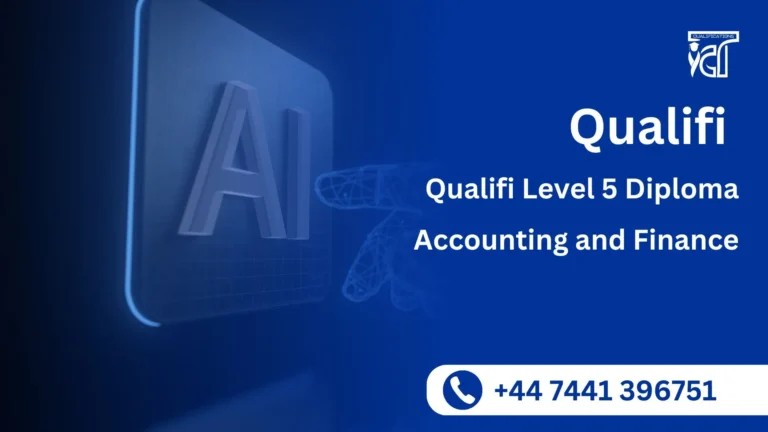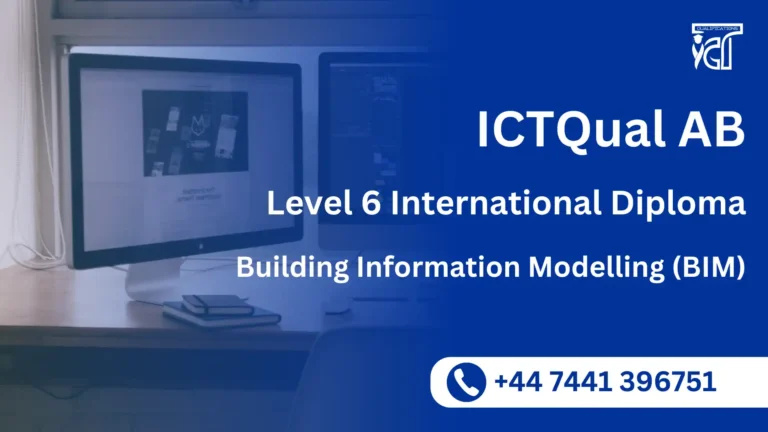The TQUK Level 6 Diploma in Accounting (RQF) is an essential qualification for individuals who are looking to take their accounting career to the next level. This Ofqual regulated qualification is designed for professionals who want to gain in-depth knowledge of advanced accounting practices, financial management, and taxation, as well as improve their overall understanding of accounting principles.
As an assignment-based course, the TQUK Level 6 Diploma provides learners with a flexible and practical approach to learning, allowing them to apply their skills in real-world accounting scenarios. In this blog post, we will provide a detailed overview of the TQUK Level 6 Diploma in Accounting (RQF), including the course introduction, benefits, study units, learning outcomes, and much more.
The TQUK Level 6 Diploma in Accounting (RQF) is specifically tailored for experienced accountants or those who have a strong foundation in accounting. This qualification is perfect for individuals who want to progress into senior accounting roles such as financial managers, auditors, and management accountants.
The course focuses on developing advanced technical accounting skills, including complex financial reporting, taxation, and audit procedures. By completing the assignment-based structure, you will gain a deeper understanding of the accounting profession and its role in supporting organizational success.
Being Ofqual regulated, this qualification ensures that learners receive high-quality education that meets the standards set by the UK government’s qualification regulatory body, making it recognized globally.
The TQUK Level 6 Diploma in Accounting (RQF) covers a comprehensive range of topics that are essential for senior accounting professionals. The course is designed to develop your critical thinking and decision-making abilities, as well as provide you with the skills needed to handle the complexities of accounting in a business environment.
The TQUK Level 6 Diploma in Accounting (RQF) is a comprehensive and highly valued qualification that provides you with the advanced skills and knowledge required to succeed in senior accounting roles. With its assignment-based structure, this Ofqual regulated course allows for flexible learning while ensuring a deep understanding of accounting principles, financial management, and taxation.
TQUK Level 6 Diploma in Accounting (RQF)
The TQUK Level 5 Diploma in Accounting (RQF) consists of 6 mandatory unit, 380 credit value, and 885 Guided Learning Hours (GLH) for this qualification.
| Sr# | Unit Title | Credit Hours |
|---|---|---|
| 1 | Advanced Management Accounting | 40 |
| 2 | Auditing in Practice | 40 |
| 3 | Business and Technology | 30 |
| 4 | Business Law | 40 |
| 5 | Financial Management | 40 |
| 6 | Financial Reporting | 40 |
| 7 | Management Accounting and Financing needs | 30 |
| 8 | Principles of Accounting and Finance | 30 |
| 9 | Regional Taxation | 45 |
| 10 | Taxation | 45 |
GLH (Guided Learning Hours) and TQT (Total Qualification Time) are terms commonly used in vocational qualifications to help define the amount of time a learner is expected to spend on their studies.
1. GLH (Guided Learning Hours)
GLH refers to the number of hours a learner spends being directly taught, supervised, or supported during their course. This includes the time spent in activities such as:
- Classroom instruction
- Practical workshops
- One-on-one tutoring or mentoring sessions
- Online learning sessions with tutor support
In other words, GLH represents the time that learners are actively engaged with their instructors or learning activities.
2. TQT (Total Qualification Time)
TQT represents the total amount of time a learner is expected to invest in completing a qualification, including:
- GLH (Guided Learning Hours): Time spent on direct learning, as explained above.
- Self-Directed Learning: This includes time spent on independent study, research, assignment completion, preparation for exams, and any other work the learner does outside of direct teaching hours.
TQT is a broader measure that includes all the time required to achieve the qualification. It helps learners and employers understand the overall commitment required for the qualification.
Key Differences Between GLH and TQT:
- GLH focuses on direct learning with guidance or supervision.
- TQT includes GLH as well as independent study time and other learning-related activities.
Example:
If a qualification has a TQT of 600 hours and a GLH of 250 hours, it means the learner should spend 250 hours in direct learning (classroom, online, or tutor-led sessions) and 350 hours on independent study or research.
Learning Outcomes for the Study Units of the TQUK Level 6 Diploma in Accounting (RQF)
1. Advanced Management Accounting (40 hours)
Upon completing this unit, learners will be able to:
- Apply advanced management accounting techniques to assess business performance.
- Analyze cost structures and recommend improvements to financial performance.
- Prepare and interpret complex budgets and forecasts for decision-making.
- Evaluate different management accounting methods and their suitability for various business scenarios.
2. Auditing in Practice (40 hours)
Upon completing this unit, learners will be able to:
- Understand the key principles of auditing, including risk assessment and audit planning.
- Evaluate the effectiveness of internal controls and identify areas of improvement.
- Perform audit procedures and interpret audit findings.
- Develop and communicate audit reports, providing assurance on financial statements.
3. Business and Technology (30 hours)
Upon completing this unit, learners will be able to:
- Assess the impact of technological advancements on business operations and financial management.
- Utilize business technology tools for financial analysis, reporting, and decision-making.
- Understand the role of IT systems in improving efficiency and accuracy in accounting functions.
- Analyze and apply best practices for integrating new technologies in business environments.
4. Business Law (40 hours)
Upon completing this unit, learners will be able to:
- Understand key principles of business law and their implications for financial transactions.
- Analyze and apply legal requirements related to business operations and financial reporting.
- Identify risks and legal issues related to contracts, mergers, acquisitions, and partnerships.
- Interpret and apply relevant laws to resolve disputes and ensure compliance in business practices.
5. Financial Management (40 hours)
Upon completing this unit, learners will be able to:
- Apply financial management techniques to optimize business capital structure and financial performance.
- Evaluate financial statements and use ratios to assess the financial health of a business.
- Develop financial strategies to manage business risks and improve profitability.
- Make informed decisions regarding financing options, investment opportunities, and capital budgeting.
6. Financial Reporting (40 hours)
Upon completing this unit, learners will be able to:
- Prepare and present financial reports in accordance with accounting standards.
- Understand and apply complex financial reporting frameworks such as IFRS and GAAP.
- Analyze the financial position of a business using advanced financial reporting techniques.
- Provide accurate financial insights to stakeholders through comprehensive reporting.
7. Management Accounting and Financing Needs (30 hours)
Upon completing this unit, learners will be able to:
- Identify and analyze the financing needs of businesses at different stages of growth.
- Use management accounting information to determine the financing structure for business expansion.
- Assess the effectiveness of management accounting techniques in meeting financing objectives.
- Advise on the best financing strategies to meet the business’s long-term goals.
8. Principles of Accounting and Finance (30 hours)
Upon completing this unit, learners will be able to:
- Demonstrate a thorough understanding of the fundamental principles of accounting and finance.
- Apply basic financial management concepts to real-world accounting situations.
- Interpret financial statements and understand the underlying financial concepts.
- Use principles of accounting to analyze financial data and make informed business decisions.
9. Regional Taxation (45 hours)
Upon completing this unit, learners will be able to:
- Understand regional tax laws and regulations affecting businesses in specific regions.
- Apply regional tax principles to manage tax liabilities and comply with local tax requirements.
- Analyze the impact of regional taxation on business operations and financial decisions.
- Advise businesses on tax planning and strategies to minimize tax burdens within a regional context.
10. Taxation (30 hours)
Upon completing this unit, learners will be able to:
- Understand and apply core principles of business taxation, including corporate tax, VAT, and income tax.
- Develop tax strategies to optimize financial outcomes for businesses and individuals.
- Analyze tax legislation and ensure compliance with regulatory requirements.
- Provide tax planning advice to businesses and individuals to reduce tax liabilities.
Benefits of the TQUK Level 6 Diploma in Accounting (RQF)
The TQUK Level 6 Diploma in Accounting (RQF) is a highly respected qualification that offers a wide range of benefits for individuals looking to advance their careers in accounting and finance. Here are the key advantages of completing this Ofqual-regulated qualification:
1. Ofqual Regulated and Globally Recognized
As an Ofqual regulated qualification, the TQUK Level 6 Diploma in Accounting meets the high educational standards set by the UK’s regulatory body. This ensures the qualification is globally recognized, providing international career opportunities and credibility in the accounting field.
2. Develop Advanced Accounting Skills
This qualification helps you develop advanced skills in accounting, including financial reporting, financial management, auditing, and taxation. These competencies are essential for senior roles in accounting, enabling you to confidently handle complex financial tasks and decision-making.
3. Career Advancement Opportunities
The TQUK Level 6 Diploma opens doors to a wide range of career opportunities. Upon completion, you will be qualified for roles such as Financial Manager, Management Accountant, Tax Advisor, or Audit Manager. This qualification is ideal for those looking to progress into senior accounting roles or expand their expertise in specific accounting fields.
4. No Exams – Assignment-Based Learning
One of the major benefits of this qualification is that it is entirely assignment-based, meaning there are no exams. This allows learners to work at their own pace, applying their knowledge to real-world scenarios and focusing on practical skills that will be used in their careers. It offers greater flexibility for busy professionals who need to balance work and study.
5. Comprehensive Coverage of Accounting Areas
The TQUK Level 6 Diploma in Accounting covers a broad range of accounting topics, including financial management, auditing, taxation, business law, and management accounting. This comprehensive curriculum ensures that learners gain a well-rounded understanding of accounting, which is crucial for senior-level roles in the industry.
6. Boost Your Employability and Professional Credibility
Completing the TQUK Level 6 Diploma in Accounting significantly boosts your employability. Employers seek candidates with strong technical accounting knowledge, and this qualification demonstrates your proficiency in a wide range of accounting practices, making you a competitive candidate in the job market.
7. Develop Strategic Decision-Making Skills
Through this qualification, learners gain the ability to analyze complex financial data and make informed decisions. You’ll learn how to evaluate financial performance, optimize financial strategies, and make strategic decisions that can impact the financial success of a business.
8. Enhance Your Knowledge of Taxation
The course delves into various aspects of taxation, including corporate tax, regional tax regulations, and tax planning strategies. This knowledge is invaluable for individuals who want to specialize in business taxation or pursue careers in tax advisory roles.
9. Prepare for Higher-Level Qualifications
This qualification serves as a strong foundation for further studies in accounting and finance. You can progress to higher-level qualifications such as the Chartered Accountancy (ACA, ACCA, CIMA) or other professional certifications, which will enable you to specialize and gain advanced qualifications within the accounting profession.
10. Flexible Study Options
The assignment-based nature of the course allows learners to study at their own pace, making it easier to manage alongside professional and personal commitments. The flexibility of the course is ideal for busy working professionals seeking to advance their careers without the pressure of strict exam deadlines.
11. Practical, Real-World Learning
The TQUK Level 6 Diploma in Accounting emphasizes practical application, with assignments designed to simulate real-world accounting situations. This hands-on approach ensures that learners can apply the knowledge gained directly to their workplace, making them more effective in their roles.
12. Improve Organizational Financial Performance
For those already working in accounting roles, this qualification will allow you to contribute more effectively to your organization’s financial success. You will gain the skills to analyze financial data, make strategic financial decisions, and ensure the financial stability and growth of the business.
Who Is the Best Fit for the TQUK Level 6 Diploma in Accounting (RQF)?
The TQUK Level 6 Diploma in Accounting (RQF) is designed for individuals looking to advance their careers in the accounting and finance sectors. The following profiles best suit the course:
Individuals Seeking Professional Recognition: Those aiming to gain a globally recognized, Ofqual-regulated qualification that enhances their professional credibility and improves employability in the accounting field.
Experienced Accountants: Professionals with a solid foundation in accounting who wish to further enhance their expertise and transition into senior roles, such as Financial Manager, Management Accountant, or Audit Manager.
Finance Graduates: Those with a basic understanding of accounting principles who are looking to deepen their knowledge and specialize in areas like financial management, auditing, and taxation to enhance their career prospects.
Aspiring Tax Professionals: Individuals interested in specializing in taxation and looking to build their expertise in areas like corporate tax, regional tax regulations, and tax planning.
Business Owners and Managers: Entrepreneurs or business owners who want to develop a better understanding of financial management and business accounting to make more informed decisions and improve business performance.
Accounting Professionals Seeking Career Advancement: Those looking to move into more senior or specialized roles in the accounting industry, such as roles in audit, management accounting, or taxation.
Entry Requirements
Register Now
Qualification Process
Qualification Process for the TQUK Level 6 Diploma in Accounting (RQF)
- Self-Assessment:
Begin by evaluating your eligibility to ensure you meet the qualification requirements, including work experience, knowledge, and language proficiency. - Registration:
Complete your registration by submitting the required documents, including a scanned copy of a valid ID, and paying the registration fee. - Induction:
An assessor will conduct an induction to confirm your eligibility for the course and explain the evidence requirements. If you do not meet the criteria, your registration will be canceled, and the fee will be refunded. - Assignmnets & Evidence Submission:
Provide all assignmnets and the necessary evidence based on the assessment criteria outlined in the course. If you are unsure of the required evidence, consult with the assessor for guidance on the type and nature of evidence needed. - Feedback and Revision:
The assessor will review your submitted evidence and provide feedback. Evidence that meets the criteria will be marked as “Criteria Met,” while any gaps will be identified. You will be asked to revise and resubmit if needed. - Competence Evidence:
Submit final evidence demonstrating that all learning outcomes have been met. This evidence will be marked as “Criteria Met” by the assessor once it is satisfactory. - Internal Quality Assurance (IQA):
The Internal Quality Assurance Verifier (IQA) will review your evidence to ensure consistency, quality, and compliance with standards. - External Verification:
The IQA will submit your portfolio to TQUK External Quality Assurance Verifiers (EQA) for final confirmation. The EQA may contact you directly to verify the authenticity of your evidence. - Certification:
Upon successful completion of all checks, TQUK will issue your official certificate, confirming that you have attained the TQUK Level 6 Diploma in Accounting (RQF).







